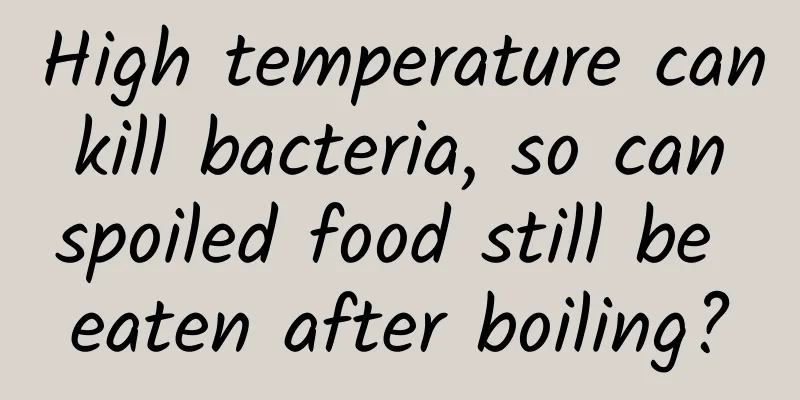High temperature can kill bacteria, so can spoiled food still be eaten after boiling?

|
Author: Mei Xue, Chief Physician of the Emergency Department, Beijing Chaoyang Hospital, Capital Medical University Reviewer: Guo Shubin, Chief Physician of the Emergency Department, Beijing Chaoyang Hospital, Capital Medical University Eating safe and secure meals three times a day is an important guarantee for a healthy life. However, many elderly people like to hoard food. Even though some of the food is past its expiration date or even moldy, they are reluctant to throw it away. Sometimes, to avoid waste, they will heat up expired and spoiled food before eating. So, can spoiled food still be eaten after being boiled at high temperature? Let's discuss this together. 1. The harm of food spoilage to human body Figure 1 Copyright image, no permission to reprint Food spoilage refers to the change in the physical and chemical properties of food under the influence of external factors, resulting in a decrease in quality, change in color, deterioration in taste, and even the emission of unpleasant odors, thereby losing its edible and nutritional value. Food spoilage is related to microorganisms such as bacteria and fungi in the air. These microorganisms can be found everywhere in the daily environment and are easily found in all aspects of food production, processing, transportation, storage and sales. When contaminated food encounters a suitable temperature, bacteria and fungi will multiply and decompose nutrients such as protein, fat and carbohydrates in the food. In this process, certain enzymes contained in the food itself can also promote the decomposition of food ingredients, thereby accelerating the process of food spoilage. In addition to losing its nutritional value, spoiled food also produces a series of toxins that are harmful to human health. After people eat it, they may experience vomiting, diarrhea, nausea and other symptoms at the mildest, or food poisoning and even the risk of death at the worst. Specifically, eating spoiled food can cause intestinal damage, food poisoning, and cancer. Figure 2 Copyright image, no permission to reprint 1. Intestinal inflammation Intestinal inflammation is the most common harm caused by eating spoiled food. Spoiled food contains a large number of Salmonella, Staphylococcus aureus, etc. After these bacteria enter the human body, they will severely irritate the human intestines and cause diseases such as acute gastroenteritis and bacterial dysentery. Generally, they manifest as abdominal pain, nausea, vomiting and diarrhea. 2. Food poisoning When food spoils, it will produce many toxic substances due to the metabolism of microorganisms. For example, spoiled fresh Tremella fuciformis and spoiled starch products are prone to produce fumonisin. This toxin can cause irreversible damage to important organs of the human body, and there is currently no specific antidote for it in medicine [1]. Food poisoning can range from mild symptoms of nausea and vomiting to severe symptoms of jaundice, hematuria, hematemesis, and even death. In addition, sprouted potatoes, moldy sugarcane, etc. can also produce toxins that can cause damage to the central nervous system. 3. Carcinogenic The carcinogenicity of spoiled food is mainly related to aflatoxin. Aspergillus flavus is one of the strongest known carcinogens[1] and is easily found in grains, oil crops, and dried fruits. Meat and dairy products may also be contaminated with aflatoxin. Aflatoxin is extremely toxic. Ingesting large amounts of it in a short period of time can cause liver damage, while long-term intake can greatly increase the risk of cancer. 2. Can spoiled food still be eaten after boiling? Since food spoilage is caused by external microorganisms, can we kill the microorganisms in the spoiled food by using high temperatures so that it can be eaten safely? The answer is no! This is because some bacteria are resistant to high temperatures and cannot be completely eliminated even after heating. In addition, most of the toxins contained in spoiled food cannot be reduced or eliminated by high temperatures, such as aflatoxin and fumonisin, which are very heat-resistant. In other words, spoiled food can still cause vomiting, diarrhea, food poisoning, etc. after boiling. In addition, even if only part of the spoiled food is rotten and the rest looks intact, it is not suitable to continue eating. For example, moldy fruit is common in life. Studies have shown that for some moldy fruits, even if the rest looks normal to the naked eye, they contain a lot of mold. If you continue to eat them at this time, it will only increase the risk of getting sick. 3. Tips for daily food safety As the saying goes, "Diseases come from the mouth." Only by ensuring the hygiene and safety of food ingredients can we avoid food safety hazards to the greatest extent. In our daily lives, we can follow the following steps. After cooking, food should be eaten on the same day as much as possible. Cooked food may produce a large number of harmful bacteria after being left for 4 to 5 hours. Therefore, if cooked food needs to be stored for 4 to 5 hours, it should be kept at low temperature. Food must be cooked thoroughly before consumption, especially poultry, meat and milk. You should choose processed foods, such as sterilized milk or meat that has passed quarantine, and avoid eating game. Food that has been stored in the refrigerator must be reheated to above 70°C before consumption. Figure 3 Copyright image, no permission to reprint Raw food and cooked food should be processed with different cutting boards and knives, and served separately. Keep cooking utensils, kitchen utensils and tableware clean. If possible, it is best to disinfect them before use. Wash your hands before handling food. Wash your hands after defecation, including changing diapers for infants and young children, and cleaning up pet poop. Avoid direct contact with food if the skin on your hands is damaged. Keep the kitchen clean, sort and dispose of household waste in a timely manner to avoid breeding of flies, bedbugs, etc. It is recommended to discard suspected contaminated ingredients. Drinking water should be kept clean. Turbid or odorous water sources should be professionally tested to ensure safety before drinking, and avoid drinking raw water. In short, we should be careful with spoiled food and try to eat it while it is fresh and within its shelf life. Once the nature of the food is found to have changed, it should be discarded in time, and we must not lose the big picture for the small. References Xu Dong, Han Hongwei. Will frozen food go bad? [J]. Invention and Innovation·High School Students, 2022(8):54-55. |
<<: What would happen to humanity if the Earth lost its atmosphere?
>>: Are you also staying up late to retaliate? The night is so beautiful, but it is also dangerous!
Recommend
How can medical and health products be accurately placed on Xiaohongshu to achieve high ROI?
For brands, Xiaohongshu has become an important p...
Event Operations: 18 pages of secrets for explosive growth!
How can I successfully swipe the screen? The most...
4 stages and 8 methods to attract new members and retain new members in WeChat groups
The community is the most effective and convenien...
Chen Tong passed Lei Jun's test. Xiaomi TV's "rebound" came too suddenly.
"Beijing New Yunnan Hotel" has always b...
What is responsible release?
Wang Xuejie, Gu Dangen, Chinese Society of Fisher...
Three revelations from Obama wearing wearable devices
As early as 2014, US President Obama expressed hi...
Are activity operations still following hot topics?
Internet companies have transplanted the form of ...
Neither Trump's coming to power nor Wei Jianjun's cold water can change the chip narrative of China's electric vehicles
The US presidential election has come to an end. ...
Tractica: Global robotics market to reach $248.5 billion in 2025
The global robotics market continues to shift tow...
Does Pinduoduo’s 5.9 yuan saving card save a lot or is it a big scam?
Pinduoduo’s activities always bring surprises. Do...
World Stroke Day | Correctly understand stroke, and sudden death is no longer "unpredictable"
Author: Wang Huiping, Wan Shan, Wang Yanhua, Scho...
Promotion and marketing are difficult. Here are 3 steps to teach you how to use traffic pools to create a closed marketing loop!
As the number of incremental Internet users decre...
Why do we need to build an Apple bidding intelligent delivery platform?
It was somewhat difficult to adapt to the transit...
How to use Tik Tok for marketing and traffic generation?
The world belongs to those who seize the initiati...
The "Giant Panda" in the farmland: We finally know how old it is!
Produced by: Science Popularization China Author:...









